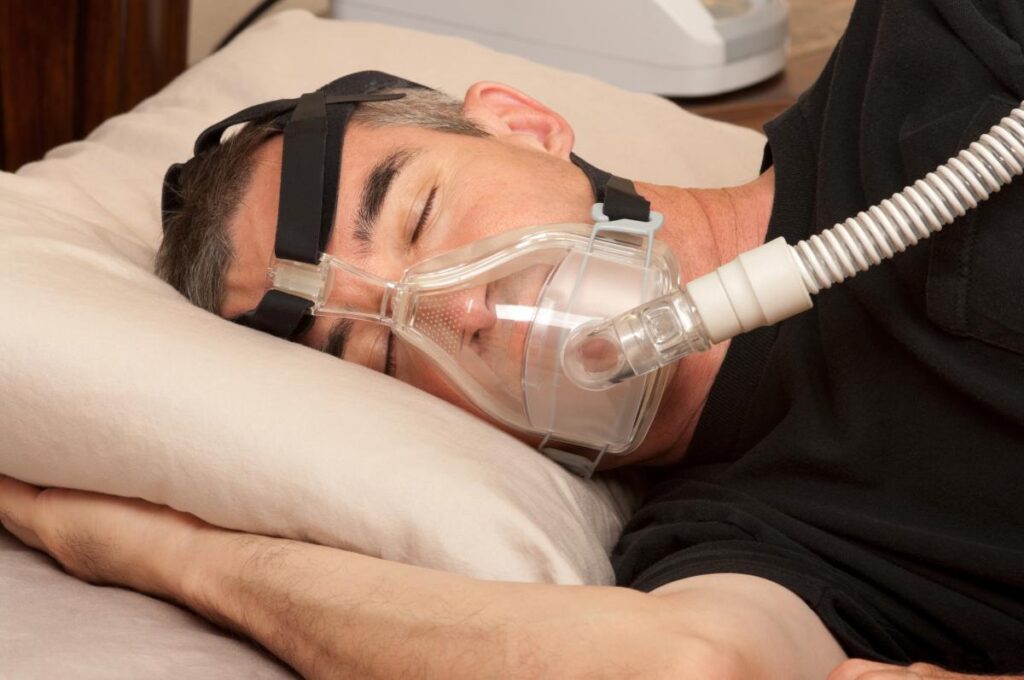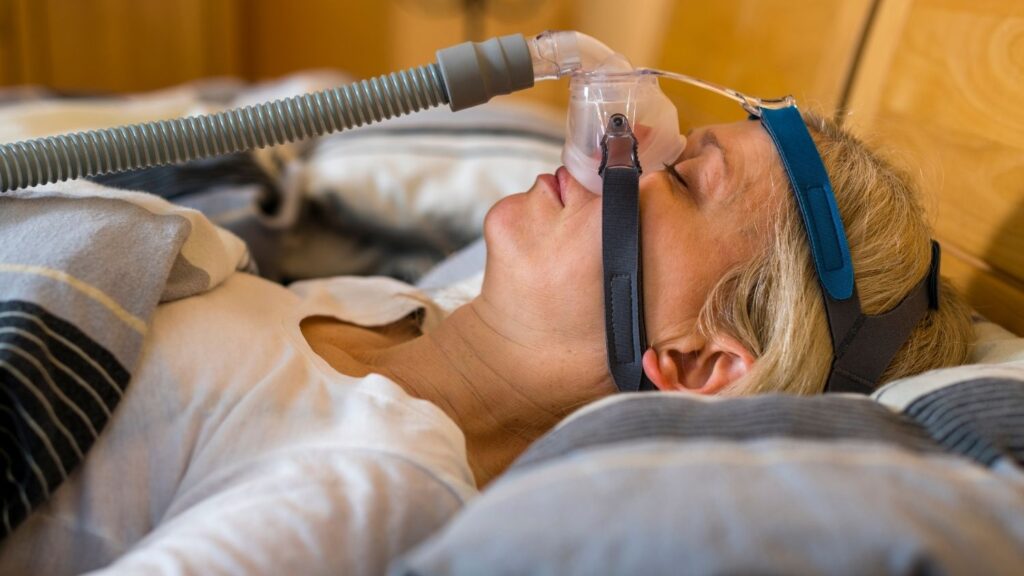If left untreated, sleep apnea is a potentially dangerous medical disease that may cause cardiac issues. Therefore, it’s essential to schedule a visit with your doctor as soon as possible. You’ll need their professional counsel and a unique treatment strategy made to address your particular sleep problems. If you’re interested in lifestyle modifications and all-natural strategies to treat your sleep apnea, keep reading.
What is apneic sleep?
A condition called sleep apnea causes short breathing pauses while you’re asleep. You may not acquire enough oxygen as a result of this condition and need to use sleep apnea machine, which may cause you to gasp for breath and awaken. In the morning, you may or might not recall these sleep disruptions. The following are typical signs of sleep apnea: fatigue, loud snoring, headaches upon awakening, dry mouth or sore throat, difficulty focusing, shortness of breath upon awakening, and daytime lethargy.
You may not be aware of all the breathing pauses if you have undiagnosed sleep apnea and believe your sleep cycle is still normal. Loud snoring and sleep apnea may have similar sounds.
How To Recognize Sleep Apnea in People
Particularly untreated sleep apnea is directly associated with a higher risk of metabolic and cardiovascular disease.
The two basic forms of sleep apnea are as follows:
Obstructive snoring (OSA)
Obstructive sleep apnea, the most prevalent kind, occurs when the tongue stops the passage of air to the back of the throat.
Central snoring (CSA)
Central sleep apnea is a less frequent kind of sleep apnea that develops when your brain fails to communicate properly with the breathing muscles.
Modifications to one’s lifestyle and treatments for sleep apnea
As you may be aware, the standard course of therapy for sleep apnea is using an artificial breathing equipment known as a CPAP, or “continuous positive airway pressure.” The majority of the time, a CPAP machine is quite effective, but some individuals find it unpleasant.
By altering your lifestyle, using your CPAP, and according to these health recommendations, you may be able to improve your sleep apnea. Here are some methods to enhance your sleeping habits and even treat your sleep disorder:

Maintain a healthy weight.
Doctors often advise obese patients with sleep apnea to undertake a weight reduction program. Obstruction of the airways might raise your risk of weight gain, particularly in your upper body. Any relief from strain on your windpipe might lessen sleep apnea symptoms.
According to research, obese people who lose only a little weight may no longer need upper airway surgery or long-term CPAP treatment.
Lessen nasal sneezing
If you have sinus or congestion issues, treating these may help you snore less and improve your airways, enabling you to sleep better at night.
Using a sinus spray or saline solution in a Neti pot to rinse your nose, keeping hydrated by drinking plenty of fluids, and avoiding foods like dairy products that could aggravate congestion are a few natural solutions.
Alter your sleeping position
Although it may seem like a little adjustment, sleeping on your side as opposed to your back may greatly reduce the symptoms of sleep apnea. Over 50% of obstructive sleep apnea patients, according to a 2006 research, were influenced by sleep posture. 3 According to other research, lying on your back might exacerbate your problems. Some people found that if they could sleep on their side, their breathing would return to normal. ⁴
Refuse sedatives.
Consult your doctor about how using sedatives or drinking alcohol may affect your sleep apnea. Anything that eases the muscles in your throat might make it difficult to breathe. For instance, opiates, benzodiazepines, antihistamines, or sleeping aids.
Workout
Exercise often results in weight reduction, which might lessen how severe sleep apnea is.
Additionally, it may improve sleep quality and daytime tiredness while also increasing oxygen circulation.
Use a humidifier
The air is made more humid using humidifiers. Your body and your respiratory system may get irritated by dry air. Using a humidifier will benefit you in the following ways:
- Promote easier breathing
- Reduce congestion
For extra advantage, you may wish to add some essential oils, such as peppermint, lavender, or eucalyptus oil, to your humidifiers.
Last but not least, make sure to adhere to the humidifier’s manufacturer’s cleaning recommendations to prevent mold or bacteria growth.

Make use of oral devices
Although behavioral modifications and CPAP are often the first forms of treatment, additional tools are also accessible. For instance, the American Academy of Dental Sleep Medicine encourages the use of mouth appliances in the treatment of sleep apnea.
The ADA claims that a custom-fit gadget may help you regain focus, enhance your sleep, and improve your health.
These personalized treatments, which work like mouthguards, assist in realigning the jaw and advancing the tongue and soft palate to lessen throat congestion.
Oral appliances may range from inexpensive OTC (over-the-counter) options to specially made ones that your dentist designs.
Other advice
- Hold your head high: To raise your body several inches above your waist or to raise the head of your bed, use a cervical pillow or a foam wedge.
- Give up smoking: Smoking makes your upper airway and throat more prone to swelling and inflammation, which exacerbates sleep apnea. Smokers are more prone to have OSA than non-smokers.
- Refrain from consuming caffeinated drinks a few hours before bedtime.
When should you see a physician?
If you experience any of the following signs, you should see a doctor:
- Prolonged loud snoring
- Excessive daytime drowsiness
- Morning headaches or sore throat
- Insomnia (difficulty falling or staying asleep)
- Choking, gasping noises, or shortness of breath upon awakening
Your doctor may advise that you see a sleep specialist if you suspect that you are exhibiting signs of sleep apnea. The American Board of Sleep Medicine certifies sleep specialists when they complete specialized training and successfully complete an examination.
Most sleep specialists focus on a single issue, such as sleep apnea. Some of them could also be ENT (ear, nose, and throat) experts.
Conclusion
Home remedies and certain lifestyle modifications may help control and lessen the symptoms of sleep apnea. The most effective and widespread treatment for moderate to severe sleep apnea is CPAP therapy, so you shouldn’t disregard this option. Sometimes, surgery may be necessary.
Before using any natural home treatment or procedure, discuss your choices with your doctor. While some individuals acclimate relatively well to using a CPAP machine while they sleep, others find it difficult.
If your doctor prescribes CPAP therapy, they will search for the ideal mask, machine, and pressure settings for you to provide the greatest level of comfort. When your symptoms start to worsen, go visit a doctor right away.
Other resources:
How to solve these common CPAP masks problems
Quality Sleep Hygiene: How to Fall asleep deliberately and quickly
Importance of Sleep Schedule to your Sleep Hygiene
